Adjust playback settings.
The playback menu is displayed when you press [MENU/OK] in playback mode. Choose from tabs K, L, or M.
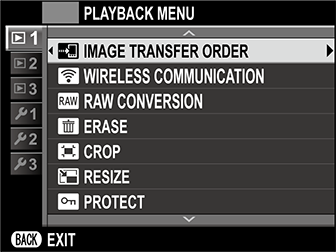
Select photos for upload to a paired smartphone or tablet.
Select U[IMAGE TRANSFER ORDER] > [SELECT FRAMES] in the playback menu.
Highlight photos and press [MENU/OK] to select or deselect. Repeat until all the desired photos have been selected.
Press [DISP/BACK] to exit to playback.
If [ON] is selected for r[CONNECTION SETTING] > [Bluetooth SETTINGS] > [Bluetooth ON/OFF], upload will begin shortly after you exit to playback or turn the camera off.
Image transfer orders can contain a maximum of 999 pictures. Protected pictures, RAW images, “gift” pictures, and movies cannot be selected for upload.
When [WIRELESS COMMUNICATION] is assigned to the [Fn] button and [PAIRING/TRANSFER ORDER] is selected for r[CONNECTION SETTING] > GENERAL SETTINGS > r[BUTTON SETTING], the [Fn] button can be used to select pictures for upload. To deselect all images, select [RESET ORDER] for [IMAGE TRANSFER ORDER]. To upload pictures as they are taken, select [ON] for r[CONNECTION SETTING] > [Bluetooth SETTINGS] > [AUTO IMAGE TRANSFER].
Connect to smartphones running the latest version of the “[FUJIFILM Camera Remote]” app. The smartphone can be used to browse the images on the camera, download selected images, control the camera remotely, or upload location data to the camera.
For downloads and other information, visit:
RAW pictures store information on camera settings separately from the data captured by the camera image sensor. Using j[RAW CONVERSION], you can create JPEG copies of RAW pictures using different options for the settings listed on “Setting”. The original image data are unaffected, allowing a single RAW image to be processed in a multitude of different ways.
With a RAW picture displayed, press [MENU/OK] to display the playback menu.
Press the selector up or down to highlight j[RAW CONVERSION] in the playback menu and press [MENU/OK] to display settings.
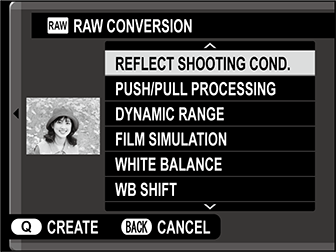
These options can also be displayed by pressing the [Q] button during playback.
Press the selector up or down to highlight a setting and press the selector right to display options. Press the selector up or down to highlight the desired option and press [MENU/OK] to select and return to the settings list. Repeat this step to adjust additional settings.
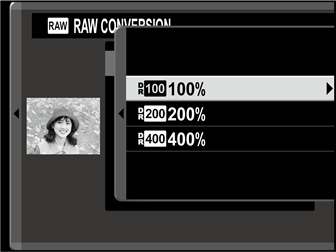
Press the [Q] button to preview the JPEG copy and press [MENU/OK] to save.
The settings that can be adjusted when converting pictures from RAW to JPEG are:
| Setting | Description |
|---|---|
| [REFLECT SHOOTING COND.] | Create a JPEG copy using the settings in effect at the time the photo was taken. |
| [PUSH/PULL PROCESSING] | Adjust exposure. |
| [DYNAMIC RANGE] | Enhance details in highlights for natural contrast. |
| [FILM SIMULATION] | Simulate the effects of different types of film. |
| [WHITE BALANCE] | Adjust white balance. |
| [WB SHIFT] | Fine-tune white balance. |
| [COLOR] | Adjust color density. |
| [SHARPNESS] | Sharpen or soften outlines. |
| [HIGHLIGHT TONE] | Adjust highlights. |
| [SHADOW TONE] | Adjust shadows. |
| [NOISE REDUCTION] | Process the copy to reduce mottling. |
| [COLOR SPACE] | Choose the color space used for color reproduction. |
Delete individual pictures, multiple selected pictures, or all pictures.
Deleted pictures cannot be recovered. Protect important pictures or copy them to a computer or other storage device before proceeding.
| Option | Description |
|---|---|
| [FRAME] | Delete pictures one at a time. |
| [SELECTED FRAMES] | Delete multiple selected pictures. |
| [ALL FRAMES] | Delete all unprotected pictures. |
Select [FRAME] for [ERASE] in the playback menu.
Press the selector left or right to scroll through pictures and press [MENU/OK] to delete (a confirmation dialog is not displayed). Repeat to delete additional pictures.
Select [SELECTED FRAMES] for [ERASE] in the playback menu.
Highlight pictures and press [MENU/OK] to select or deselect (pictures in photobooks or printer orders are shown by S). Selected pictures are indicated by check marks (R).
When the operation is complete, press [DISP/BACK] to display a confirmation dialog.
Highlight [OK] and press [MENU/OK] to delete the selected pictures.
Select [ALL FRAMES] for [ERASE] in the playback menu.
A confirmation dialog will be displayed; highlight [OK] and press [MENU/OK] to delete all unprotected pictures.
Pressing [DISP/BACK] cancels deletion; note that any pictures deleted before the button was pressed cannot be recovered.
If a message appears stating that the selected images are part of a DPOF print order, press [MENU/OK] to delete the pictures.
Create a cropped copy of the current picture.
Display the desired picture.
Select G[CROP] in the playback menu.
Use the sub-command dial to zoom in and out and press the selector up, down, left, or right to scroll the picture until the desired portion is displayed.
Press [MENU/OK] to display a confirmation dialog.
Press [MENU/OK] again to save the cropped copy to a separate file.
Larger crops produce larger copies; all copies have an aspect ratio of 3:2. If the size of the final copy will be a, [YES] will be displayed in yellow.
Create a small copy of the current picture.
Display the desired picture.
Select O[RESIZE] in the playback menu.
Highlight a size and press [MENU/OK] to display a confirmation dialog.
Press [MENU/OK] again to save the resized copy to a separate file.
The sizes available vary with the size of the original image.
Protect pictures from accidental deletion. Highlight one of the following options and press [MENU/OK].
Protected pictures will be deleted when the memory card is formatted.
Rotate pictures.
Display the desired picture.
Select C[IMAGE ROTATE] in the playback menu.
Press the selector down to rotate the picture 90° clockwise, up to rotate it 90° counterclockwise.
Press [MENU/OK]. The picture will automatically be displayed in the selected orientation whenever it is played back on the camera.
Protected pictures cannot be rotated. Remove protection before rotating pictures.
The camera may not be able to rotate pictures created with other devices. Pictures rotated on the camera will not be rotated when viewed on a computer or on other cameras.
Pictures taken with A[SCREEN SET-UP] > [AUTOROTATE PB] are automatically displayed in the correct orientation during playback.
Remove red-eye from portraits. The camera will analyze the image; if red-eye is detected, the image will be processed to create a copy with reduced red-eye.
Display the desired picture.
Select B[RED EYE REMOVAL] in the playback menu.
Press [MENU/OK].
Results vary depending on the scene and the camera’s success in detecting faces. Red eye cannot be removed from pictures that have already been processed using red-eye removal, which are indicated by a e icon during playback.
The amount of time needed to process the image varies with the number of faces detected.
Red eye removal cannot be performed on RAW images.
View pictures in an automated slide show. Press [MENU/OK] to start and press the selector right or left to skip ahead or back. Press [DISP/BACK] at any time during the show to view on-screen help. The show can be ended at any time by pressing [MENU/OK].
The camera will not turn off automatically while a slide show is in progress.
Create books from your favorite photos.
Select [NEW BOOK] for m[PHOTOBOOK ASSIST] in the playback menu.
Scroll through the images and press the selector up to select or deselect. Press [MENU/OK] to exit when the book is complete.
Neither photographs a or smaller nor movies can be selected for photobooks.
The first picture selected becomes the cover image. Press the selector down to select the current image for the cover instead.
Highlight [COMPLETE PHOTOBOOK] and press [MENU/OK] (to select all photos for the book, choose [SELECT ALL]). The new book will be added to the list in the photobook assist menu.
Books can contain up to 300 pictures. Books that contain no photos are automatically deleted.
Photobooks
Photobooks can be copied to a computer using [MyFinePix Studio] software.
Highlight a book in the photobook assist menu and press [MENU/OK] to display the book, then press the selector left or right to scroll through the pictures.
Display the photobook and press [MENU/OK]. The following options will be displayed; select the desired option and follow the on-screen instructions.
Upload pictures from the camera to a computer running the latest version of [FUJIFILM PC AutoSave] (note that you must first install the software and configure the computer as a destination for images copied from the camera).
For downloads and other information, visit:
Create a digital “print order” for DPOF-compatible printers.
Select K[PRINT ORDER (DPOF)] in the playback menu.
Select [WITH DATE]s to print the date of recording on pictures, [WITHOUT DATE] to print pictures without dates, or [RESET ALL] to remove all pictures from the print order before proceeding.
Display a picture you wish to include in or remove from the print order.
Press the selector up or down to choose the number of copies (up to 99). To remove a picture from the order, press the selector down until the number of copies is 0.
Total number of prints
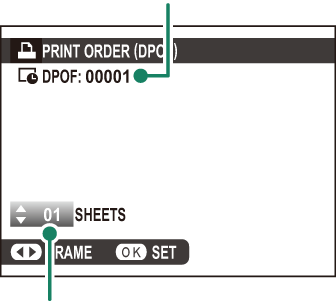
Number of copies
Repeat steps 3–4 to complete the print order.
The total number of prints is displayed in the monitor. Press [MENU/OK] to exit.
The pictures in the current print order are indicated by a u icon during playback.
Print orders can contain a maximum of 999 pictures.
If a memory card is inserted containing a print order created by another camera, you will need to delete the order before creating as described above.
To print pictures to optional [FUJIFILM instax SHARE] printers, first select r[CONNECTION SETTING] > [instax PRINTER CONNECTION SETTING] and enter the [instax SHARE] printer name (SSID) and password, then follow the steps below.
Turn the printer on.
Select V[instax PRINTER PRINT] in the camera playback menu. The camera will connect to the printer.
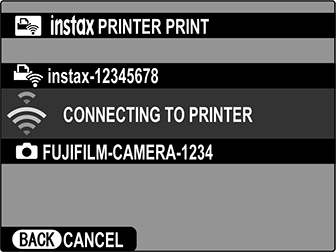
Use the selector to display the picture you want to print, then press [MENU/OK].
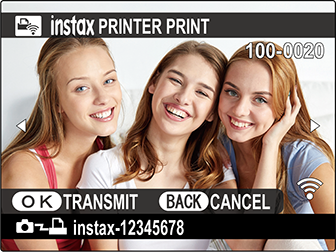
Pictures taken with other cameras cannot be printed.
The area printed is smaller than the area visible in the LCD monitor.
The displays may vary depending on the type of printer connected.
The picture will be sent to the printer and printing will start.
Choose how High Definition (HD) devices display pictures with an aspect ratio of 3:2 (this option is available only when an HDMI cable is connected). Select 16:9 to display the image so that it fills the screen with its top and bottom cropped out, 3:2 to display the entire image with black bands at either side.

| Option | ||
|---|---|---|
| [16:9] | [3:2] | |
| Display |  |
 |